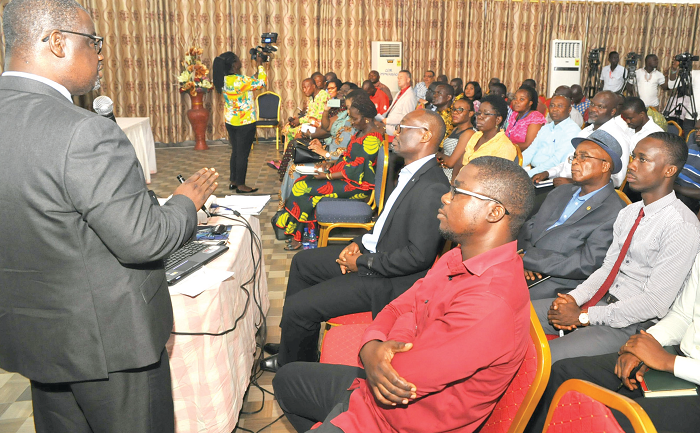Blog
Media Coalition against Galamsey involves research scientists in fight against illegal mining

A water quality monitoring and assessment index of the major rivers of Ghana from 2013 has established a considerable decrease in the quality of water in most of the river basins due to the activities of illegal miners.
The worrying trend, according to the index, which is also the result of the removal of vegetative cover, fertiliser use on farmlands, indicates that the activities of illegal mining is shown in the waters by the presence of unusually high floating solids and high turbidity during the dry season.
Poor water quality
The Director of the Water Research Institute, Professor Osmund Ansah-Asare, made this known in Accra yesterday, when the Media Coalition against Galamsey, in collaboration with the International Association of Impact Assessment – Ghana (IAIA-Ghana), took its campaign to research scientists to explain the effects of illegal mining (galamsey) on the environment to the public.
The coalition, which was led by its convener and the Managing Director of the Graphic Communications Group Limited, Mr Ken Ashigbey, met with officials of the Council for Scientific and Industrial Research (CSIR), who took them through the consequences of the galamsey menace on the environment.
Prof. Ansah-Asare made a PowerPoint presentation that revealed the extent of damage caused to the environment by the illegal miners and expressed fear that Ghanaians either risked queuing for water or would have to import water in the not too distant future.
Making a presentation on the state of water quality in the country, he disclosed that the highest areas of poor water quality were found in mining areas and that in 2010, most of the waters had decreased in quality except the River Butre, Tano, and the Barekese Reservoir.
Destruction
He showed that activities of small-scale miners, especially the illegal ones, degraded the land more than their counterparts in the large-scale sector, due to the weak legal regime.
He said what was even more disturbing was the fact that Chinese miners blocked the watercourse, denied inhabitants their source of drinking water and deteriorated the quality as well.
“The Government of Ghana has a task to improve water quality and also reduce treatment cost. Gold mining brings with it arsenic, mercury and sulphur contamination of water bodies, soil and even air,” Prof. Ansah-Asare added.
Among his recommendations was that steps should be taken to legalise galamsey for it to be monitored, to ensure the sustainability of the environment.
Making a presentation on the topic “Institutional challenges propping illegal mining; Corrective measures towards sustainable mining,” the President of the IAIA-Ghana, Mr Yaw Amoyaw-Osei, gave another perspective on the issue, saying the complexities and sophistication of galamsey required a multi-pronged, sustained and concerted approach to tackle it.
He underscored the need to entrench sound environment governance arrangement in the mining sector and also address the fundamental risks of institutional failings.
He further spoke about defining the types of illegal mining to find the appropriate customised and sustained solutions to them.
Institutional failures
“Institutional failings in mining sector environment governance has nurtured and propped galamsey into this monumental monster staring us in the face,” Mr Amoyaw-Osei said and added that the setting aside of Section 12(2) of Act 490 of the Mining law was an error in law and a sign of poor environmental practice of which the Environmental Protection Agency (EPA) and the Minerals Commission were answerable.
Mr Ashigbey, who co-chaired the event with the Deputy Director General of the CSIR, Prof. Mamaa Entsua-Mensah, said the coalition was ready to intensify its campaign to press home its case for Ghanaians to rise up to the effects of the galamsey menace on the environment.
While reiterating the objectives of the coalition to name, shame and possibly push for a jail term for offenders, Prof. Entsua-Mensah, condemned the level of environmental destruction caused and urged Ghanaians to join in the campaign to bring the menace to an end to save the environment from further destruction.
Source: Graphic Online
Calendar
| M | T | W | T | F | S | S |
|---|---|---|---|---|---|---|
| 1 | ||||||
| 2 | 3 | 4 | 5 | 6 | 7 | 8 |
| 9 | 10 | 11 | 12 | 13 | 14 | 15 |
| 16 | 17 | 18 | 19 | 20 | 21 | 22 |
| 23 | 24 | 25 | 26 | 27 | 28 | |

